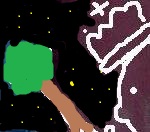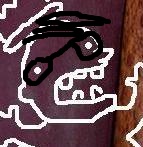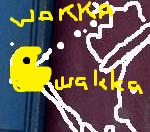Full Disclosure: Last time Burnside had a book out I reviewed it and hated it.
Review: If you liked Black Cat Bone, you’ll like All One Breath. The new collection begins with a series called ‘Self Portrait as Funhouse Mirror’, and if you thought that might portend something ludic you mightn’t’ve read Burnside before. In the opening poem, ‘Hall of Mirrors’ the child poet sees himself, ‘baby-faced / pariah; little / criminal’, before realising, ‘The backrooms of the heart are Babylon / incarnate, miles of verdigris and tallow and the cries / of hunting birds, unhooded for a kill // that never comes. / I saw that, when I saw this otherself’. The child then joins (or thinks he joins) his mother in seeing ‘what I was / beyond the child she loved, the male / homunculus she’d hoped I’d never find / to make me like my father […] a blear / of Eden from that distance in the glass […] that’s never ours alone, / including us, till everything / is choir.’ The poem rests on both presenting the story through the child’s eyes and explicitly investing the child with the understanding the poem presents. That choir image is reprised in the closing poem, ‘Choir’, but strangely tells the story of how the young poet didn’t participate in said choir. ‘Everything / is choir’ except himself; this is a neat encapsulation of the problems I have with the book.
‘Hall of Mirrors’ is easily the best poem in the collection, which might be why it’s at the front of the book and will likely be quoted at length in the breathless Guardian review when Burnside wins again. It has many of the poet’s signature features: self-reflection both literal and conceptual, nature as pathetic fallacy, other humans as pathetic fallacy (‘her face was all / reflection’), ‘dusk’ as indicator of liminal space, an ending that elides all semantic responsibility by literally/grammatically qualifying itself out of reasonable accountability. To that end, if you were to wordcloud All One Breath ‘almost’ would probably loom large, alongside ‘half’. It’s totally reasonable to describe an experience as ‘half-imagined’, but doing it twice in the same collection (‘such fauna as I only half-imagine / are ghosts out of Bewick’, ‘I felt [the dead goldfinch’s] mercy, / something only half- / imagined’, not to mention ‘I half-believed / that nothing would be there’) speaks to a narrowness of imaginative range, the poet as primary custodian of common sense and meaning. In the poem ‘Erosion’, for example, the poet looks on in scorn at his countryside neighbour rounding up sheep with a quad bike: ‘Soon he’ll have turbines up; he’ll buy out / my better neighbours, building, field by field, / his proud catastrophe / of tin and mud. / I loathe him, but it’s nothing personal […] and yet not enough in him / of worth or life / to qualify as foe’. It’s unedifying stuff, placing the poet’s own ‘wind-slender / kinship of sea and blood / and the kinship of the earth / with everything that crawls beneath the stars’ directly in contrast with his renewable energy-loving (how dare he) neighbour. The poem suffers from a logical disconnect: nature is presented as mysteriously bestowing kinship on man (via ‘sea and blood’), but it is within the poet’s remit to refuse this same kinship to his fellow. Where does the poet really believe the kin-making power lies?
There’s little escaping the sense that the ecological in All One Breath is yoked to the semantic plough. Nature does not appear in its own right (see Michael Longley, Edward Thomas, or for a more recent example Jen Hadfield), but as background colour for the performing poetic self. There are plenty of kittiwakes and larks and sparrows, but the poems in which natural life is given individual focus are ‘An Experiment on a Bird in the Air Pump, 1768’, which focuses not just on the bird’s suffering but the fear it causes in young women, and ‘Instructions for a Sky Burial’, in which a coyote’s rotten head gives rise to the poet’s wish to be disposed of similarly, ‘unwashed and naked […] where the crows / can find me’, giving back to his imagined corpse the centre stage. It’s telling that on both occasions the studied animal no longer has living agency, unable to supersede the needs of the observing self.
This habit has a particularly uncomfortable effect on the collection’s several elegies. In ‘The Day Etta Died’, for the singer-songwriter Etta James, we first watch the poet ‘marking a stack of essays / on Frank O’Hara // and each had a Wiki- / paragraph to say // who Genet was, and who / was Billie Holiday’. His students do not have the same cultural references as the poet, and are thus condemned; how does this increase our understanding of the life and importance of the singer? ‘Nocturne: Christmas, 2012’, i.m. Dennis O’Driscoll, begins ‘When I heard you had died, I went out into the yard / and stood a while, like something that belonged / to darkness’ and ends ‘[that Christmas Eve] the headlamps snagged on a ewe, in the first wet snow / and I stopped, by the side of the road, / to untangle the wire.’ Again, the elegy’s power to revitalise and restore is elided in favour of self-presentation, and a few gestures towards ‘We all need a second life’, ‘Say what you will, all making is nostalgia,’ leave only a passing, passive impression of the man elegised. Witness also the weird power dynamics in ‘The End’, in which ‘Strangers are making love / in my grandmother’s house / forty years after she died,’ and the poet wishes to address the new man of the house (the woman is off doing woman things, presumably), ‘If I could, I would tell him / a story I heard long ago […] It’s a story he doesn’t know, but halfway through / he sees that it has to end / in the safety of fog’, the unknown man becoming an extension of the poet’s authority.
Tl; dr: All One Breath is not a ‘bad book’. It’s perfectly competently put together, the lines flow and there’s plenty of dark darkness to make it sound like some deep emotion is being played out. But what this collection and The Dark Knight Rises have in common is mistaking that darkness for emotional complexity, for a challenging philosophical stance. Dude writers have been brooding over dead things for quite some time, and this isn’t breaking any new ground; it’s the book’s sheer conventionality, the artistic conservatism that pushes me away. That’s without addressing the whiff of misogyny that appears any time a woman is subject to the poem’s eye, or the epigraph addiction, the near-identical register and rhythmic similarities of each poem. In short, All One Breath is not an enlightening book, and there are a great many poets more deserving of your attention.





